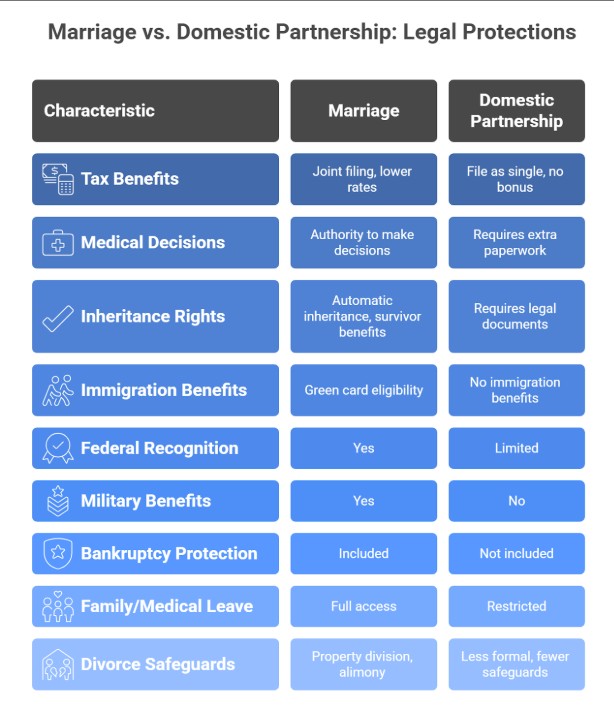Domestic Partnership vs Marriage in Florida: Key Legal Differences and Rights Explained

In Florida, marriage is recognized statewide and grants automatic rights to property, inheritance, healthcare, and taxes. Domestic partnerships offer only limited protections in certain counties or cities.
Couples in Florida who are looking to make things official face a significant decision: domestic partnership or marriage? Both come with some legal recognition, but the protections and benefits aren’t even close.
Florida doesn’t recognize domestic partnerships at the state level. Only a handful of counties and cities have local registries, and those come with fewer legal protections than marriage.
Marriage offers way more legal rights and protections in Florida. We’re discussing inheritance rights, medical decision-making, and tax benefits.
Understanding these differences really helps couples figure out what’s best for them.
Key Takeaways
- Florida doesn’t recognize domestic partnerships statewide—just in some cities and counties.
- Marriage covers everything: inheritance, medical decisions, taxes, and more.
- If couples can’t access a local domestic partnership registry, they can use contracts and estate planning to create some legal protections.
Why Marriage Offers More Protections Than Domestic Partnership

Marriage provides couples with full legal recognition in Florida, affording them all the rights and benefits that accompany it. Domestic partnerships only get limited recognition in certain counties.
Florida doesn’t recognize domestic partnerships at the state level. Only a few places, such as Miami-Dade, Broward, and Pinellas, allow couples to register as domestic partners.
| Aspect | Marriage | Domestic Partnership |
| Legal Recognition | Statewide and federal | Limited to specific counties |
| Tax Benefits | Joint filing available | No tax advantages |
| Inheritance Rights | Automatic spousal inheritance | No automatic rights |
| Medical Decisions | Legal authority granted | Limited or no authority |
Key differences include:
- Marriage gives automatic inheritance and medical decision-making rights
- Domestic partnerships are easier to dissolve than marriages
- Married couples can get federal tax breaks and Social Security benefits
- Domestic partners can’t file joint taxes
Florida began offering domestic partnerships in 1999 for couples seeking some legal recognition. But marriage is still the option with the real legal muscle.
Domestic partnerships in Florida offer limited rights. Mulligan & Associates helps couples close the gap with legal agreements and estate planning—start protecting your future today.
Does Florida Recognize Domestic Partnerships?

Florida does not recognize domestic partnerships statewide. A few counties and cities maintain registries, but rights are local only and not enforceable statewide.
Since same-sex marriage became legal in 2015, domestic partnerships have diminished in legal importance, though some still use them for hospital or employment benefits.
No Statewide Recognition—Only Specific Counties Or Cities
Florida law doesn’t recognize domestic partnerships at the state level. This creates legal headaches for unmarried couples who want property rights or other protections.
But some cities and counties in Florida do allow domestic partnerships. These local programs offer several benefits to registered couples.
Counties and cities offering domestic partnerships include:
- Miami-Dade County
- Pinellas County
- Broward County
- Various municipalities
Pinellas and Miami-Dade counties approved domestic partnership ordinances in 2012. Broward County joined in later.
These local partnerships may offer limited benefits, such as:
- Healthcare decision-making
- Health insurance coverage
- Hospital visitation
- Some employment perks
The benefits vary significantly depending on where you live. Couples should check their local county or city for details.
Same-Sex Marriage Legalized In 2015, Rendering DP Largely Redundant
Same-sex marriage became legal in Florida in 2015. The Supreme Court’s Obergefell v. Hodges decision changed everything.
Before that, same-sex couples depended on domestic partnerships for any legal standing. Florida never offered civil unions as an alternative to marriage.
Once same-sex marriage became legal, the main reason for domestic partnerships faded away. Now, same-sex couples can get full marriage rights and benefits under state and federal law.
Some opposite-sex couples still go for domestic partnerships instead of marriage. Still, couples who want legal protection must use contracts, estate planning, and other legal tools, as the state doesn’t provide sufficient support.
Counties & Cities That Offer Domestic Partnership Rights
Florida does not recognize domestic partnerships at the state level, but a few counties have established their own registries. Miami-Dade County initiated its registry in 2008, and others followed suit.
Rights Vary By Locality—Hospital, Insurance, Etc.
What you get as a domestic partner depends totally on local rules. Every county and city does its own thing.
Miami-Dade County probably offers the most benefits. Registered partners can visit each other in hospitals and jails. That’s huge if something unexpected happens.
Health insurance coverage varies by location. Some places allow partners to obtain health insurance as dependents if one partner works for the government. But this only applies to city or county employees in those areas.
Pinellas and Broward Counties have domestic partnership registries, too. The rights aren’t always the same as those in Miami-Dade, though.
Most domestic partnership benefits focus on a few things:
- Hospital visits and medical decisions
- Health insurance (for government workers)
- Some property and inheritance considerations
But let’s be real—these rights are way more limited than what marriage offers. No federal benefits or protections are available for domestic partnerships.
Florida Jurisdictions with Domestic Partnership Registries
| County/City | Year Established | Key Rights Granted (Local Only) |
| Monroe County | 1998 | Registration of domestic partners (healthcare, records) |
| Broward County | 1999 | Register, amend, terminate partnership |
| Palm Beach County | 2006 | Benefits for healthcare, employment records |
| Miami-Dade County | 2008 | Registration for partner rights & coverage |
| Orange County | 2012 | Registry access, limited local benefits |
| Pinellas County | 2012 | Healthcare decisions, guardian designation, and education access (Pinellas County) |
| Volusia County | 2012 | Healthcare, records access, and verification by institutions |
| Leon County | 2013 | Registry in official records (healthcare, institutions) (Leon County CMS, cvweb.leonclerk.com) |
| Sarasota County | 2013 | Municipal registry recognition |
| City of Orlando | N/A* | Healthcare visitation, funeral decisions, guardianship (orlando.gov) |
| City of Pensacola | 2013 | Medical decisions, education, guardian, visitation (cityofpensacola.com) |
| City of Punta Gorda | 2014 | Registrants receive wallet cards for city-scope rights (ci.punta-gorda.fl.us) |
What Legal Protections Does Marriage Offer That Domestic Partnership Doesn’t?

Marriage brings a substantial bundle of legal rights and protections that domestic partnerships cannot match.
Tax Benefits
Married folks can file a joint tax return with the IRS. That usually means lower tax rates and bigger deductions. Domestic partners have to file as single people, so no bonus there.
Medical Decisions
Marriage grants spouses the authority to make medical decisions on behalf of each other. They can visit each other in the hospital and access their medical records without needing any extra paperwork.
Inheritance Rights
Spouses inherit property automatically if their partner dies. They also get Social Security survivor benefits. Domestic partners need to set up special legal documents to achieve anything close to this.
Immigration Benefits
Marriage lets a non-citizen partner apply for a green card through their spouse. Domestic partnerships? No immigration benefits at all.
Additional Legal Protections
| Marriage Benefits | Domestic Partnership |
| Federal recognition | Limited state recognition |
| Military benefits | Not available |
| Bankruptcy protection | Not included |
| Family and medical leave | Restricted access |
Marriage also offers protection if things fall apart. Courts divide property and might award alimony. Ending a domestic partnership is typically less formal and lacks the same safeguards.
Confused about the difference between marriage and domestic partnership? Mulligan & Associates will explain your options and draft the necessary documents to safeguard your property, healthcare, and inheritance.
How To Register A Domestic Partnership (Where Available)
To register, couples must confirm that their county offers a registry, complete the required forms, sign them in front of a notary, and submit the documents along with a filing fee. Once accepted, they receive a domestic partnership certificate.
Registration only applies within that county or city and does not extend to the state or federal level.
Florida doesn’t offer domestic partnerships statewide, but some counties and cities allow local registration.
Available Locations:
- Palm Beach County
- City of Tampa
- Other select municipalities
Palm Beach County Process
Couples can register as domestic partners in Palm Beach County. They need to download and fill out a Domestic Partnership Declaration form.
You can grab these forms at the Recording Department in Room 4.2500 of the Main Courthouse. Branch locations have them too.
If you’re more of a digital person, there’s an online option through the Marriage & Domestic Partnership Kiosk system. Simply click “Continue to Domestic Partnership” to begin the digital application process.
City of Tampa Requirements
Tampa lets couples register as domestic partners through the city clerk’s office. Partners need to meet requirements in Section 12-121 of the City of Tampa Code.
Only two adults can enter into a domestic partnership agreement. Both individuals must qualify under Tampa’s rules.
Important Considerations
Local domestic partnerships only provide limited benefits, especially when you compare them to marriage. These protections only apply within the specific city or county in which they are located.
Florida state law doesn’t recognize these partnerships. Federal benefits and protections are not available through local domestic partnership agreements either.
Each city or county sets its own rules and steps. It’s a good idea to contact your local clerk’s office and request details.
If There’s No Registry In Your Area—What To Do Instead
If you’re in a Florida county without a domestic partnership registry, you can still protect your rights with private legal agreements.
These tools help establish property rights, medical decisions, and inheritance plans—things married couples typically receive automatically.
Cohabitation Agreements Explained
A cohabitation agreement acts like a contract between unmarried couples. It outlines how you’ll handle finances, property, and debts while living together.
The agreement can cover who pays rent, utilities, and groceries. It also outlines what happens to shared items if the relationship ends.
Key items to include:
- Property ownership rules
- Bank account access
- Debt responsibility
- Pet custody arrangements
- Household expense sharing
It’s best to put the agreement in writing and have both people sign it. A lawyer can ensure the contract complies with Florida law.
This document becomes especially important if you buy a home together. Without marriage, Florida doesn’t automatically give both partners ownership rights.
Wills, Powers Of Attorney, Healthcare Surrogate
Estate planning documents provide unmarried couples with legal control over significant decisions. These papers matter if one partner can’t speak for themselves.
A will allows you to leave property to your partner after you pass away. Without a will, Florida gives your assets to blood relatives, not your partner.
Essential documents include:
- Will: Controls property after death
- Power of Attorney: Handles money decisions
- Healthcare Surrogate: Makes medical choices
- Living Will: States end-of-life wishes
A power of attorney form lets one partner handle the other’s finances if they’re sick or injured. The healthcare surrogate document allows your partner to make medical decisions on your behalf in a hospital setting.
It’s a good idea to update these documents on a regular basis. Life changes—like new property or health problems—mean you’ll want to review your paperwork.
Title And Beneficiary Designations
Property titles and beneficiary forms determine who receives assets without the need for court proceedings. These tools usually work faster than wills.
You can set up joint bank accounts or name a payable-on-death beneficiary. This way, your partner gets access to money right away.
Common beneficiary designations:
- Life insurance policies
- Retirement accounts
- Investment accounts
- Vehicle titles
- Real estate deeds
Home deeds can list both partners as owners. Florida recognizes joint tenancy with right of survivorship for unmarried couples.
Beneficiary forms on retirement accounts override whatever your will says. It’s a good idea to review these forms every few years to keep them up to date.
Couples in Florida face significant decisions when considering a domestic partnership versus marriage. Each path comes with its own set of legal protections and perks.
Marriage stands out for its stronger legal recognition at both the state and federal levels. It gives couples broad rights for property division, inheritance, and medical decisions—stuff that can really matter when life gets complicated.
Domestic partnerships, on the other hand, get limited recognition in Florida. Florida law doesn’t recognize domestic partnerships at the state level, so that couples may encounter unexpected legal roadblocks.
Key factors to keep in mind:
- Legal rights – Marriage usually means broader protection.
- Tax benefits – Federal tax rules tend to favor married couples.
- Property rights – Marriage can make asset protection a lot clearer.
- Dissolution process – Ending a marriage requires a formal court process.
Family law attorneys help couples determine what works best for their lives. The right choice depends on your unique situation and what you want for the future.
Some folks like the flexibility that comes with domestic partnerships. Others just want the full legal coverage that marriage brings.
Either way, it’s wise to consider all the financial and legal implications. A good family law professional can help you make choices that actually protect your interests.
The legal differences between these arrangements can significantly impact many aspects of day-to-day life together. It’s worth taking the time to get it right.
Conclusion
Couples in Florida face critical decisions when choosing between a domestic partnership and marriage. Each option provides different legal protections and benefits.
Marriage offers stronger legal recognition at both the state and federal levels. It provides comprehensive rights for property division, inheritance, and medical decisions.
Domestic partnerships have more limited recognition in Florida. Florida law does not recognize domestic partnerships at the state level, creating potential legal challenges.
Key factors to consider:
• Legal rights – Marriage provides broader protection • Tax benefits – Federal tax advantages favor married couples • Property rights – Marriage offers more straightforward asset protection • Dissolution process – Marriage termination requires formal court proceedings
Family law attorneys can help couples understand their specific situations. The choice depends on individual circumstances and long-term goals.
Some couples prefer the flexibility of domestic partnerships. Others want the full legal protections that marriage provides.
Both options require careful consideration of financial and legal implications. Consulting with a family law professional helps ensure couples make informed decisions that protect their interests.
The legal differences between these arrangements affect many aspects of couples’ lives together.
Don’t rely on limited county protections. Call Mulligan & Associates at 352-593-5990 to secure the same peace of mind marriage provides—with customized legal solutions for unmarried couples.
Frequently Asked Questions
Does Florida recognize domestic partnerships statewide?
No. Florida has no statewide domestic partnership law. A few counties and cities maintain registries that grant limited rights, such as hospital visitation or insurance access; however, these protections apply only locally and do not extend statewide or federally.
What rights do domestic partnerships provide in Florida?
Domestic partnerships in Florida offer only local protections. Common benefits include hospital visitation rights, limited decision-making authority over healthcare, and access to some employer-provided insurance. They do not grant inheritance, tax advantages, or federal benefits available through marriage.
How is marriage different from domestic partnership in Florida?
Marriage is recognized statewide and federally. It provides automatic rights to property division, inheritance, healthcare decision-making, spousal benefits, and tax advantages. Domestic partnerships are local only and lack statewide recognition, making them much weaker legally than marriage.
Can domestic partners inherit from each other automatically?
No. Domestic partners do not inherit automatically under Florida law. Without a will, trust, or beneficiary designation, assets pass according to intestacy statutes. Estate planning documents are essential for partners who want to leave property to each other.
Can domestic partners file joint taxes in Florida?
No. Domestic partners cannot file jointly at the state or federal level. Only married couples can file taxes together and receive related financial benefits, such as tax deductions and credits for spouses.
How do you register a domestic partnership in Florida?
Registration is only possible in specific counties or cities. Couples must complete a form, sign it in front of a notary, pay a fee, and submit it to the local clerk. Once registered, rights are limited to that jurisdiction and do not extend statewide.
What if my county does not offer domestic partnership registration?
Couples in areas without registries should utilize legal tools such as cohabitation agreements, wills, trusts, and healthcare surrogate designations. These documents provide legal protections similar to those automatically granted in marriage.
